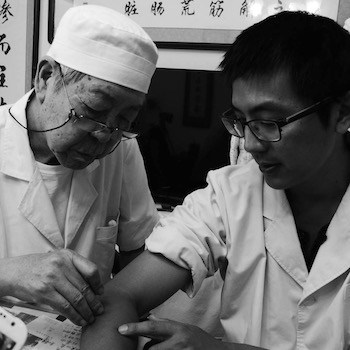Over ten years ago, I was introduced to Dr. Wang Ju-yi by a Chinese American friend who at the time was studying Applied Channel Theory. I went to Dr. Wang for acupuncture treatments, and I still remember how relaxed I felt the moment I walked into his clinic. He carried himself with a warmth and conscientiousness, that was the spark that changed the entire direction of my life.
In 2007, I enrolled in the Beijing University of Chinese Medicine, while also beginning my studies with Dr. Wang in 2008. The foundational knowledge provided by my university studies was essential, but it was the time I spent with Dr. Wang – nine years in total, that developed my passion for TCM. From Dr. Wang, I learned a lot of practical clinical skills, such as channel palpation. In addition, he taught me how to properly think about Chinese medical theory, especially channel theory.
From 2012 until Dr. Wang’s passing last August, I was his main assistant. Over time, I realized that I had a growing responsibility to pass on his teachings to future generations. In addition to teaching Applied Channel Theory to students in China and abroad, I also helped work on two of Dr. Wang’s Chinese books, An Introduction to Applied Channel Theory (《经络医学概论》) and Wang Ju-yi’s Case Studies in Applied Channel Theory (《王居易针灸医案讲习录》). Both of these books are being translated into English.
I have been working at the Ling Lan TCM Clinic in Beijing. Like all students of Dr. Wang, we all have come to the conclusion that if we don’t palpate the channels, we won’t know how to proceed with the treatment. Channel palpation helps to clarify the diagnosis, which leads to better clinical results. There are always fascinating things that happen when using Applied Channel Theory, which keeps me motivated to focus on this approach and deepen my understanding of it.

